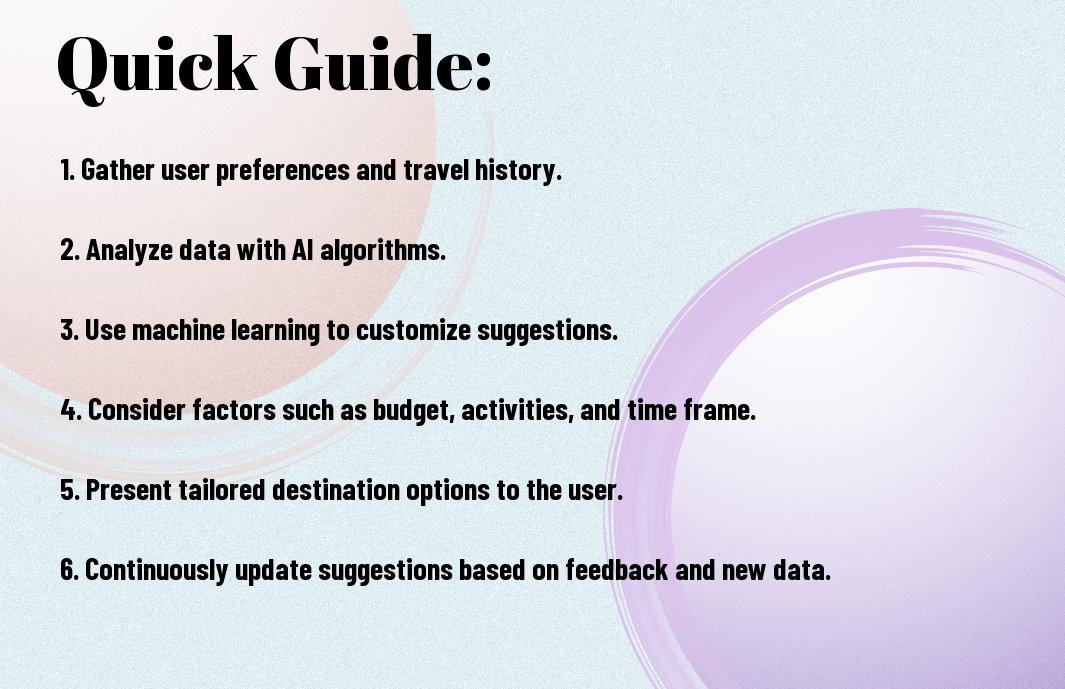AI technology has revolutionized the way we plan our vacations by offering personalized travel destination recommendations based on our preferences and interests. Gone are the days of generic travel guides, as AI can now analyze vast amounts of data to suggest tailored destinations suited to your unique tastes. In this guide, we will explore how you can use AI to discover the perfect travel destination for your next adventure.
Key Takeaways:
- Personalized Recommendations: AI can provide tailored travel destination suggestions based on individual preferences.
- Machine Learning Algorithms: By analyzing user data and behavior patterns, AI can predict and recommend the most suitable destinations.
- Enhanced User Experience: Using AI for travel suggestions can improve user experience by offering relevant and personalized recommendations.
- Cost and Time Efficiency: AI algorithms can save time and effort by quickly sorting through extensive travel options to present the most suitable ones.
- Multiple Data Sources: AI can gather information from various sources such as travel history, preferences, reviews, and social media to provide comprehensive suggestions.
- Continuous Improvement: AI systems can continuously learn and adapt based on feedback and user interactions, offering increasingly accurate recommendations over time.
- Customization Options: Users can provide feedback and adjust preferences to further enhance the accuracy and relevance of the suggested travel destinations.
Understanding AI-powered Travel Recommendations
Before delving into how AI-powered travel recommendations work, it’s important to understand the different types of AI used in delivering tailored travel destination suggestions. From machine learning algorithms to natural language processing, AI models are utilized to analyze vast amounts of data to provide personalized recommendations for travelers. These technologies work together to process information such as travel histories, preferences, and even social media interactions to offer suggestions that are unique to each individual.
Types of AI used in travel suggestions
- Machine Learning Algorithms
- Natural Language Processing (NLP)
- Recommender Systems
- Deep Learning
- Computer Vision
Knowing how each of these AI technologies functions is crucial in understanding how travel recommendation engines generate tailored suggestions for users. Importantly, these technologies continuously learn and adapt to user preferences based on their interactions with the platform, making the recommendations increasingly accurate over time.
How AI learns traveler preferences
On a fundamental level, AI learns traveler preferences by analyzing user behaviors, feedback, and historical data to understand what destinations, activities, or accommodations appeal to individual users. By processing vast amounts of data, AI can identify patterns and trends that help in predicting what a specific user may be interested in for their next trip.
With AI-powered recommendation systems, the more a user engages with the platform, the more data the system has to predict and suggest destinations that align with their preferences. This continuous learning process enables AI to refine its suggestions and offer increasingly relevant travel recommendations to users.

Factors Influencing AI-driven Destination Suggestions
The
Personalization factors: demographics, interests, and behavior
Personalization is key to providing tailored travel destination suggestions. AI algorithms take into account various factors to recommend destinations that match individual preferences. These factors include demographics such as age, gender, and profession, as well as interests like outdoor activities, cultural experiences, or culinary delights. Additionally, user behavior data such as past travel history, search queries, and booking patterns play a crucial role in determining suitable recommendations.
- Demographics and interests are fundamental in personalizing travel suggestions.
- Though behavior data provides real-time insights for more accurate recommendations.
External factors: weather, events, and travel restrictions
For AI to provide relevant travel destination suggestions, it considers external factors like weather conditions, upcoming events, and travel restrictions. Weather forecasts help in recommending destinations with ideal climates based on user preferences. Knowledge of local events allows AI to suggest places with festivals, concerts, or exhibitions that align with users’ interests. Furthermore, awareness of travel restrictions such as visa requirements or health advisories ensures that the recommendations are feasible for the traveler.
- Assume that weather and events greatly influence travel decisions.
- Assume that considering travel restrictions is crucial for practical recommendations.
User feedback and ratings
Obtaining user feedback and ratings after a trip is vital for enhancing AI-driven destination suggestions. Demographic data helps in understanding which aspects of a destination appealed to different groups of travelers, allowing for more tailored recommendations in the future. Ratings provided by users can indicate the satisfaction level with a suggested destination, leading to adjustments in the algorithm to improve future suggestions.
- Suggestions are continuously refined based on user feedback and ratings.

Tips for Getting the Most Out of AI-driven Travel Suggestions
Many travelers rely on AI-driven systems to provide tailored travel destination suggestions based on their preferences and interests. To make the most out of these suggestions, here are some tips to consider:
Be specific with your preferences
- Provide detailed information about your travel preferences such as activities you enjoy, preferred weather, budget constraints, and specific attractions you want to visit.
- Include any dietary restrictions or accessibility requirements to ensure that the AI recommendations align with your needs.
Assume that the more specific you are with your preferences, the more accurate and personalized the travel suggestions will be.
Provide accurate information
Even with AI technology, the accuracy of travel suggestions heavily relies on the information provided by the traveler. Be sure to input correct dates, locations, and any other relevant details to receive the most relevant recommendations.
Information such as your travel dates, preferred modes of transportation, and accommodation preferences will help the AI system tailor its suggestions to your needs effectively.
Explore beyond popular destinations
Explore a variety of travel destinations beyond the most popular ones to discover hidden gems and unique experiences. By providing accurate information about your interests and preferences, AI systems can suggest lesser-known destinations that align with your travel style.
Consider exploring off-the-beaten-path locations recommended by AI to create a more personalized and memorable travel experience.
accurate.
A Step-by-Step Guide to Using AI for Travel Planning
For the ultimate personalized travel experience, utilizing AI for tailored destination suggestions is a game-changer. With the help of AI-powered travel assistants, you can discover unique and exciting travel destinations that align perfectly with your preferences. Here’s a step-by-step guide to using AI for travel planning:
Setting up your AI-powered travel assistant
Keep all your travel preferences in mind when setting up your AI-powered travel assistant. Make sure to input details such as your preferred travel dates, budget, interests, and any specific requirements you may have. By providing comprehensive information upfront, the AI can better tailor its suggestions to suit your needs effectively.
| Step 1: Create an account | Step 2: Input your travel preferences |
| Step 3: Connect your social accounts | Step 4: Provide feedback to improve recommendations |
Inputting your travel preferences
Now that you’ve set up your AI-powered travel assistant, it’s time to input your travel preferences. This step is crucial as it helps the AI understand your likes and dislikes, enabling it to suggest destinations that align with your interests. Whether you’re a beach lover, history buff, foodie, or adventure seeker, providing accurate information will ensure you receive tailored recommendations.
It’s imperative to be as specific as possible when inputting your travel preferences. Include details such as preferred activities, types of accommodations, transportation preferences, and any must-see landmarks or attractions on your list. The more information you provide, the better equipped the AI will be to curate destination suggestions that resonate with your travel style and preferences.
Reviewing and refining your destination suggestions
On receiving destination suggestions from your AI-powered travel assistant, take the time to review and refine them based on your preferences. Look through the recommended destinations, read about their attractions, cultural offerings, and traveler reviews. Refine your choices by adding or removing destinations to create a personalized itinerary that excites you.
When reviewing your destination suggestions, consider factors such as travel time, weather conditions, local events, and any additional information provided by the AI. Take advantage of any customization features to further tailor your travel recommendations to match your preferred travel experience. By actively engaging with the suggested destinations and refining them based on your preferences, you can create a bespoke travel itinerary that promises a memorable journey.
It’s Your Journey
Be mindful of, the AI-powered travel assistant is there to enhance your travel planning experience by offering tailored suggestions based on your preferences. By actively participating in setting up your preferences, reviewing recommendations, and refining them as needed, you can create a travel itinerary that reflects your unique travel style and interests. Embrace the power of AI to discover new and exciting destinations that will make your travel experiences truly unforgettable.
Weighing the Pros and Cons of AI-driven Travel Suggestions
| Pros: personalized recommendations, time-saving, and accuracy | Cons: limited human touch, potential biases, and dependency on data |
| 1. Personalized recommendations based on user preferences | 1. Limited emotional connection and personal touch |
| 2. Time-saving with quick and efficient suggestions | 2. Potential biases in AI algorithms affecting suggestions |
| 3. Higher accuracy in predicting travel destinations | 3. Dependency on data availability for accurate recommendations |
Pros: personalized recommendations, time-saving, and accuracy
Some of the key benefits of using AI for tailored travel destination suggestions include personalized recommendations that are based on user preferences, saving time through quick and efficient suggestions, and higher accuracy in predicting travel destinations. By analyzing vast amounts of data, AI algorithms can offer recommendations that match specific interests and requirements, leading to a more tailored travel experience for users.
Cons: limited human touch, potential biases, and dependency on data
AIdriven travel suggestions may lack the human touch and emotional connection that can be provided by traditional travel agents or guidebooks. Additionally, there is a risk of potential biases in AI algorithms that could influence the recommendations made to users. Moreover, the accuracy of AI-driven suggestions is highly dependent on the availability and quality of data used to train the algorithms.
Cons: While AI can provide personalized recommendations, there is a downside to the lack of human touch in the suggestions. It is necessary for users to be aware of the potential biases that can exist in AI algorithms and the level of dependency on data for accurate travel suggestions.

Overcoming Common Challenges with AI-driven Travel Suggestions
Dealing with inaccurate or incomplete data
One common challenge when using AI for tailored travel destination suggestions is dealing with inaccurate or incomplete data. AI algorithms rely heavily on data inputs to make accurate recommendations, and when the data is flawed, it can result in misleading suggestions for travelers.
Managing expectations and flexibility
While AI can provide personalized travel recommendations based on specific criteria, it’s important for users to understand that AI-driven suggestions may not always align perfectly with their preferences. Managing expectations and remaining flexible in exploring different options can help travelers make the most of AI suggestions.
It’s necessary for travelers to keep an open mind and be willing to adjust their preferences based on the recommendations provided by AI. By embracing flexibility, travelers can discover new and exciting destinations that may have been overlooked otherwise.
Integrating AI with human travel expertise
With the growth of AI technologies in the travel industry, integrating AI with human travel expertise can provide a more comprehensive and personalized experience for travelers. While AI can analyze vast amounts of data to make recommendations, human travel experts can offer insights, recommendations, and personalized suggestions that take into account nuances that AI may overlook.
data
Conclusion
Following this exploration of using AI for tailored travel destination suggestions, it becomes evident that artificial intelligence has the capability to revolutionize the way we plan our vacations. By analyzing vast amounts of data and personal preferences, AI can provide individualized recommendations that cater to each traveler’s unique interests and preferences. This personalized approach not only enhances the overall travel experience but also saves time and energy in researching and selecting the ideal destination.
After all is said and done, the integration of AI into the travel industry is a game-changer that can significantly improve customer satisfaction and drive more personalized travel experiences. As technology continues to advance, we can expect even more sophisticated AI systems that will further refine and enhance the process of suggesting tailored travel destinations, making travel planning more convenient and enjoyable for globetrotters around the world.
FAQ
Q: What is AI for tailored travel destination suggestions?
A: AI for tailored travel destination suggestions is a technology that uses artificial intelligence algorithms to analyze user preferences and behavior in order to recommend personalized travel destination options.
Q: How does AI suggest travel destinations?
A: AI suggests travel destinations by collecting and analyzing data such as past travel history, search queries, social media activity, and personal preferences to create customized recommendations.
Q: What are the benefits of using AI for tailored travel destination suggestions?
A: The benefits of using AI for tailored travel destination suggestions include saving time on research, discovering new and unique destinations, receiving personalized recommendations, and enhancing the overall travel experience.
Q: Is AI for tailored travel destination suggestions accurate?
A: AI for tailored travel destination suggestions can be accurate based on the quality and quantity of data provided by the user. The more information and feedback the AI receives, the more accurate the recommendations will be.
Q: Can AI for tailored travel destination suggestions be trusted?
A: AI for tailored travel destination suggestions can be trusted as long as the user provides accurate data and preferences. Users should also review and verify the recommendations before making any travel decisions.
Q: How can I use AI for tailored travel destination suggestions?
A: You can use AI for tailored travel destination suggestions by utilizing travel planning websites, mobile applications, or virtual assistants that offer personalized travel recommendations based on AI algorithms.
Q: Is AI for tailored travel destination suggestions free to use?
A: The availability and cost of using AI for tailored travel destination suggestions may vary depending on the platform or service provider. Some services may offer basic recommendations for free, while more advanced features may require a subscription or payment.